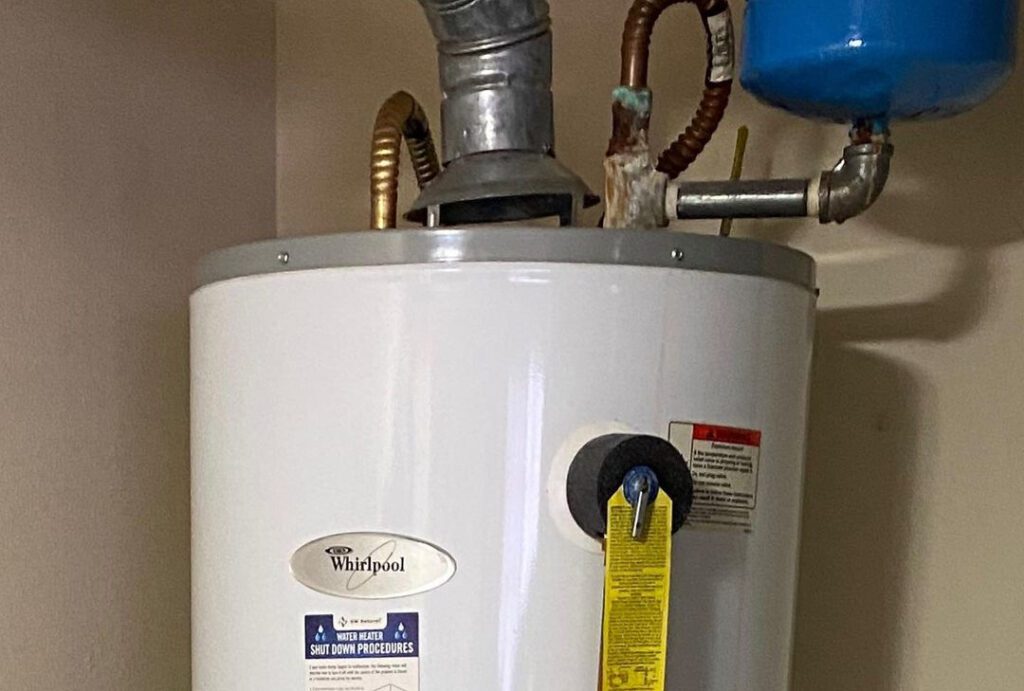We’ve heard it before many, many times before: someone steps into the shower to get ready for work in the morning and the water refuses to get warm. And we certainly understand how a cold water shower can ruin a day right off the bat. Whether it’s been a gradual decline or a sudden change, we have some hot water heater troubleshooting tips that you as a homeowner can look into before shopping for a new unit.
Some of these ideas may seem a little beyond your skill set, and that’s fine. Hot water heaters are an important part of the home and you may feel like you don’t want to mess things up any more than they already are! If your hot water issues persist, reach out to Simpson Plumbing and get started on a free quote for water heater service. (The link takes you to a different site.)
One thing we would like to mention before you do any DIY work on your water heater: while the threat isn’t as bad as it was in the past, standard water heater tanks should still be approached with caution. Gas water heaters, in particular, can present risks such as gas leaks or combustion issues if not properly maintained.
A malfunctioning gas water heater may lead to the release of carbon monoxide, a colorless and odorless gas that can be harmful or even fatal. Additionally, an improperly functioning pressure relief valve could result in excessive pressure buildup, leading to a possible explosion.
Electric water heaters carry their own set of risks, including the potential for electrical fires if the wiring is somehow faulty. Regular maintenance, attention to proper ventilation, and prompt addressing of any issues are essential for ensuring the safe operation of your hot water heater. If you have concerns about your unit, please don’t hesitate to give us a call!
Before You Begin Inspecting Your Hot Water Heater
Before grabbing your toolbox and diving into action, here are a few things to think about:
Check for Power Supply: Make sure the heater is receiving power. Confirm that the circuit breaker hasn’t tripped and that the unit is plugged in. It could be as easy as resetting the circuit, although if it continues to trip, there may be bigger issues to deal with. Call a professional electrician in this case.
Inspect Pilot Light: If you have a gas water heater, check the pilot light. If it’s out, relight it following the manufacturer’s instructions.
Thermostat Settings: Verify that the thermostat is set to the desired temperature and adjust it gradually if needed.
Temperature Pressure Relief Valve: Test the temperature pressure relief valve by lifting and releasing it. Water should discharge, indicating proper functioning.
Flush the Tank: Sediment buildup can affect performance and keep water from flowing freely. Flush the tank to remove sediment, following the manufacturer’s guidelines. Start by turning off the heater and allowing it to cool. Next, locate the drain valve near the bottom of the tank (as per manufacturer’s guidelines). Connect a hose to the valve and place the other end in a drain or bucket.
Open the valve and let a few gallons of water drain out. If you notice cloudy or sandy water, sediment is present. Repeat this process until the water runs clear. Regularly flushing the tank helps prevent sediment buildup, ensuring your water heater operates efficiently and prolongs its lifespan
Inspect for Water Leaks: Check for any visible leaks around the unit, connections, or pipes. A leaking water heater can affect its performance.
How to Troubleshoot Your Electric Water Heater
Several problems can plague conventional water heaters and force the household into a standstill until repaired. Use this guide to help figure out what’s going wrong with your unit.
If your electric water heater has:
An inadequate amount of hot water supply
- Turn the water heater thermostat up a degree. Use caution and make only gradual increases in temperature. Hot water scalds.
- Confirm the water heater is large enough for your needs. If not, you may need to replace the water heater with a bigger model or even consider a tankless water heater.
- Turn off the power at the circuit breaker or fuse box and check for loose wiring and bad connections.
- Check the elements.
- Check the fill tube and dip.
Hot water at first, but it quickly runs out
- Check for a buildup of sediment.
- Turn off the power at the circuit or fuse box and check the wire connections.
- Check the elements, thermostats, and beginning temperature. If the temperature reading is incorrect, then your heater will malfunction.
If you find a lot of sediment in your water heater, you may want to check the anode rod. An anode rod in your hot water heater plays a crucial role in preventing corrosion by attracting corrosive elements/sediment in the water. To check it, turn off the heater and locate the rod’s access point on top of the tank.
Use a wrench to loosen and remove the hex head, revealing the anode rod. If it’s less than half an inch thick or shows significant corrosion, it’s time for a replacement. Installing a new anode rod can extend the life of your water heater and maintain its efficiency by sacrificing itself to protect the tank from rust and deterioration.
No hot water
- Check the circuit breaker or fuse box.
- Check the water heater power.
- Find the reset button and push it.
- Confirm that the upper element and thermostat are working.
Water that’s too hot
- Turn down the thermostat.
- Inspect the thermostat function and look for grounded elements.
- Check that the thermostat fits tightly to the water heater.
Gas Water Heater Not Working
Both electric and gas water heaters can present similar symptoms when something is going wrong. However, depending on the problem, there are different ways to remedy the situation. When your gas water heater has:
An inadequate amount of hot water
- Turn the thermostat up a degree. Be careful not to increase the heat too much. Hot water temperatures will scald.
- Get a bigger or more powerful water heater. If you often run out of hot water, you may need a new and larger unit.
- Clean the burner orifice to make sure it’s working properly or if it’s clogged.
- Check the gas pressure. Call the gas company to help you with a gas pressure problem.
No hot water
- Check to see if the pilot light is on. If the pilot is out, you or a professional will need to relight it.
- Read the gas meter and check the gas cutoff valve. If the gas isn’t on, contact your gas company.
A pilot light that keeps going out
- Check that the thermocouple probe tip is inside the pilot flame and make sure the thermocouple is wound tightly at the control valve. Check for twists. If everything seems in working order, but the light won’t stay on, you may need to replace the thermocouple.
- Check the gas control valve. There’s no repairing a gas control valve. If it malfunctions, you’ll need to replace the valve.
- Check the main burner. You might need to clean or unclog it.
- Check the weather. Pilot lights can go out when wind gusts create downdrafts from the flue.
A pilot light that won’t ignite even though the gas is on
- The pilot orifice may be clogged. Clean it.
- The pilot supply line could be blocked or bent. It may need to be replaced.
- The gas line might contain air. Remove air from the line by holding down the pilot button. Try re-igniting the pilot light. The first attempt at relighting might fail. Try at least twice.
Vancouver, WA Water Heater Repair
If you’ve come this far, you must be committed to fixing or troubleshooting your water heater. The good news is that if you prefer a technician to come to inspect and make specific recommendations for you instead of doing it yourself, you can schedule that!
After all, who doesn’t love to save time and energy? On the other hand, if you’ve tried all of these methods and your water heater is still having issues, it might just need to be repaired or replaced. Most water heaters have a lifespan of 8 to 12 years, so it’s not uncommon to begin seeing issues within that time frame.
With over 35 years of experience, Simpson Plumbing is prepared to make any of the necessary repairs to keep your water heater healthy and continue serving you or install a new one if your water heater has run its course. Be sure to view our water heater special, and don’t hesitate to reach out if you have any questions!


 About Us
About Us  Services
Services  Plans
Plans  Commercial
Commercial